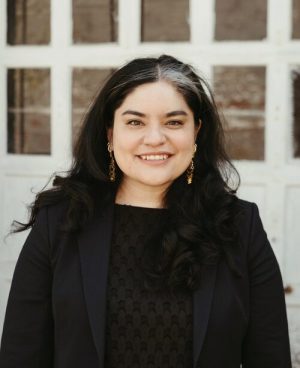Janett Barragán Miranda (Latina/Latino Studies) is a 2022–2023 HRI Faculty Fellow. Miranda’s book, Hungry for Equality, examines how the Mexican-origin community responded to the implementation of federal food assistance programs throughout the U.S. Southwest as part of “the War on Poverty” declared by President Lyndon B. Johnson in 1964.
Learn more about HRI’s Campus Fellowship Program, which supports a cohort of faculty and graduate students through a year of dedicated research and writing in a collaborative, interdisciplinary environment.
What is unique about your research on this topic?
During the 1960s, food assistance programs — the Food Stamps Program (FSP); National School Lunch Program (NSLP); and Women, Infants, and Children (WIC) —were supposed to be available to eligible participants in counties throughout the United States. However, this community was both outraged and placed at a disadvantage when these programs were not implemented in their neighborhoods, or when eligibility requirements were unclear, or when the criteria for receiving aid were out of reach for eligible households. At the root of this book are the struggles encountered by the Mexican-origin community as they confronted welfare officials, social workers, politicians, and nutrition experts. In the process, ordinary people became leaders—creating and implementing grassroots food programs, suing the entities in charge of implementing food assistance, and marching in the streets when their needs were not met.
When federal food assistance programs failed to meet the needs of the Mexican-origin community, the people responded by fighting to reform the programs or developing their own solutions—and in the process, positioned themselves as experts on hunger. In Sacramento, the Brown Berets created a program for school children which ran for fifteen years. In 1968, Alta and Alejo Hernandez sued the United States Department of Agriculture (USDA) when their county did not offer any form of federal food assistance. They won the lawsuit, and the judge demanded that the USDA institute programs in counties throughout California, ruling that equal access to food assistance was a civil right. Representatives of the Mexican-origin community from throughout the Southwest went to the White House to speak back to scientists and policy makers about the shortcomings of federal food assistance. Through their efforts, the community worked to underscore that hunger was —in part—the result of racism, which resulted in social inequalities that policymakers and social workers were unprepared and often unwilling to address.
What drives your interest in this research?
I’m interested in exploring the powerful responses by ordinary people to the implementation of federal food assistance in the United States. This research intersects with issues of civil rights, politics, and welfare. I think there are implications in the present if we understand the ways that power and food has functioned to racialize groups in the past.
How has the fellowship seminar impacted the way you approach your research?
The fellowship seminar has allowed me to engage with scholars in different fields. Their research and their input on my own research has really helped me to gain perspective on how my work is received by people who focus on different aspects of the human condition.
